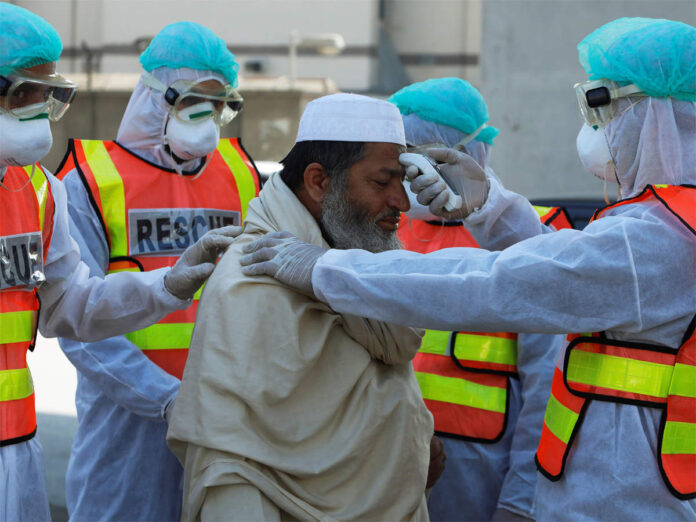ISLAMABAD: As Pakistan is waiting for its turn to buy a vaccine to defend its population against the coronavirus, Punjab and Khyber Pakhtunkhwa (KP) governments have approved strategies to roll out the immunisation drive in phases.
The federal government which has approved $250 million in funding to buy vaccines late last month decided to purchase 1.2 million doses from China’s Sinopharm.
Last month, Dr Faisal Sultan, state minister for national health services, said, during the initial phase, the focus will be exclusively on the most vulnerable 5 percent of the population including frontline healthcare workers.
The Punjab government on Thursday devised a three-stage plan to vaccinate its over 110 million population, health officials said.
Addressing a press briefing, Captain (r) Muhammad Usman, provincial primary and secondary healthcare secretary, said, in line with the strategy prepared by the federal government, the most vulnerable or high-risk individuals will be given the vaccine jab in the first phase.
Those first in line to be vaccinated will include frontline healthcare workers interacting directly with coronavirus carriers and individuals over 65 years of age.
In the second stage, he said, medics and professionals, who do not come in direct contact with the virus-infected will be administered the vaccine, as well as people over 60 years of age.
Finally, in the third and last stage, the vaccination drive will be open to the rest of the public, he added.
With the help of the National Database and Registration Authority (NADRA), the healthcare department has identified some 0.5 million healthcare workers dealing with coronavirus patients, Usman explained.
About 9.5 million people are over the age group of 65 and 16.8 million are of and above 60 years in the country. Both will be on the list of priority groups, he said.
While detailing the use of rapid antigen testing in the province, Barrister Nabeel Awan, Punjab specialised healthcare and medical education department secretary, told reporters that Punjab has decided against utilising the rapid testing kits for the time being.
“The price of a PCR test is cheaper these days than that of an antigen test,” he said, adding: “Plus the antigen test is not as reliable as PCR.” An antigen test kit costs between Rs1,200 to Rs1,600 each while a PCR test costs around Rs700, Awan said.
The secretary also said that till now, the UK virus mutant strain has not been detected in Punjab.
KHYBER PAKHTUNKHWA:
Meanwhile, the KP government has also devised a phase-wise plan for the procurement and distribution of the vaccine.
Under this programme, a Provincial Vaccine Administration and Coordination Cell (PVACC) has been established under the direction of KP health secretary.
According to a notification issued by the KP government, district vaccine administration and coordination cells have also been established across all 35 districts including the erstwhile tribal areas. These will be led by the additional deputy commissioners (ADCs).
The provincial government has identified 280 health facilities and formed a Health Vaccine Administration Cell (HVAC) across the province including the merged districts where the vaccine will be administered to frontline health works in the first phase.
DOMESTIC VACCINE:
Pakistan is currently running phase III clinical trials for CanSino Biologics’ vaccine candidate, Ad5-nCoV, led by the National Institute of Health (NIH).
Hassan Abbas of AJ Pharma, CanSino’s local representative, told Reuters that recruitment for the trial will be completed in 10 days.
“Preliminary results will be shared 4 or 5 days after recruitment is completed, and these will include the efficacy of the vaccine,” Abbas said, adding that thus far there have been no serious side effects.
“AJ Pharma is one of five companies that have applied for a license to distribute the vaccine in Pakistan once approved,” he added.




